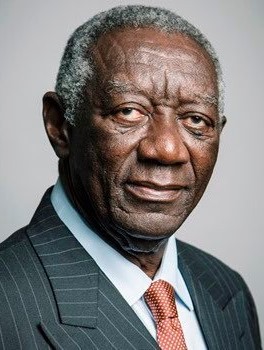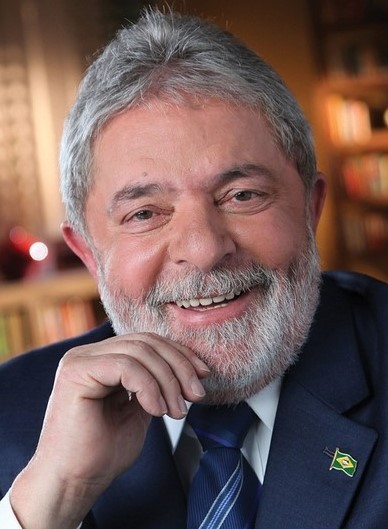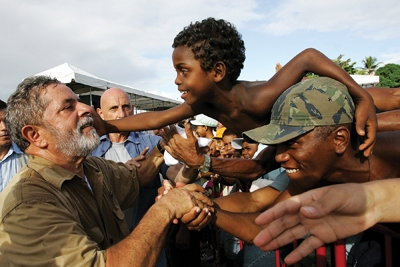

John Agyekum Kufuor &
Luiz Inácio Lula da Silva
GHANA AND BRAZIL
John Agyekkum Kufuorr and Luiz Nácio Lula Da Silva were honored as the 2011 World Food Prize Laureates for their personal commitment and visionary leadership while serving as the presidents of Ghana and of Brazil, respectively, in creating and implementing government policies to alleviate hunger and poverty in their countries.
Full Biography
John Agyekum Kufuor was born in 1938 in Kumasi, Ghana, to Nana Ama Dapaah—called Ama Paa—and Nana Kwadwo Agyekum, a local Asante chief. Kufuor’s family ancestry goes back at least 300 years to the founding of the Asante Empire in what is present-day Ghana.
When Kufuor was a young man, his mother gave financial support to and offered her house as a meeting place for a number of emerging nationalist leaders who wished to preserve Asante culture and increase self-determination in the movement toward independence from Britain. These leaders, who had been trained at Oxford, Cambridge, and the University of London, provided Kufuor with inspiration to seek a good education. He attended one of the very few schools existing in Kumasi at the time, called the Government Boys’ School. His uncle then sent him to Osei Tutu Boarding School about seven miles from Kumasi, where he performed at the top of his class. He graduated from Prempeh College, enrolled at Lincoln’s Inn, London, and passed the bar exam at the age of only 22. Kufuor then entered Oxford University where he earned a bachelor’s degree in economics, philosophy and politics, and a master’s degree in economics.
Kufuor’s pursuit of the law as a profession and his interest in politics developed as his country embarked on the path to establishing more democratic institutions after a period of political, social and economic turmoil. His first government post was as chief legal officer and city manager of Kumasi from 1967 to 1969. Kufuor served as Deputy Minister of Foreign Affairs in the liberal democratic government of Kofi Abrefa Busia from 1969 to 1972. During a military overthrow of Busia, Kufuor and many other officials were imprisoned for a year.
He remained involved in politics through the intervening years, winning the presidency in 2000 and re-election in 2004. His administrations pursued a socio-economic transformation for Ghana through a multi-pronged approach that prioritized the modernization of agriculture for rural development, private sector participation, enhanced social services, and infrastructure development. Significant achievement in these areas led to increasing the living standards of the majority of Ghana’s poverty-stricken citizens.
A guiding principle for President John Kufuor during the entirety of his two terms as president was to improve food security and reduce poverty through public and private sector initiatives. To that end, he implemented major economic and educational policies that increased the quality and quantity of food to Ghanaians, enhanced farmers’ incomes, and improved school attendance and child nutrition through a nationwide feeding program.
Under President Kufuor’s leadership, Ghana became the first sub-Saharan African country to cut in half the proportion of its people suffering from hunger, and the proportion of people living on less than a dollar per day, thus achieving UN Millennium Development Goal Number 1 before the 2015 deadline. Continuing Ghana’s tradition of stability, President Kufuor prioritized national agricultural policies: Ghana saw a reduction in its poverty rate from 51.7 percent in 1991 to 26.5 percent in 2008, and hunger was reduced from 34 percent in 1990 down to 9 percent in 2004.
President Kufuor’s economic reforms, including the Food and Agriculture Sector Development Policy, provided incentives and strengthened public investments in the agricultural and food sector – the backbone of Ghana’s economy – which grew at a rate of 5.5 percent between 2003 and 2008. Growth in the agricultural sector drove expansion in the national economy, with GDP quadrupling to 8.4 percent by 2008.
Under President Kufuor, the Agricultural Extension Service was reactivated and special attention was paid to educating farmers on best practices. As a result, Ghana’s cocoa production doubled between 2002 and 2005, and food crops such as maize, cassava, yams and plantains increased significantly, as did livestock production.
The Ghana School Feeding Program launched by President Kufuor provided one nutritious, locally produced meal per day for school children in kindergarten to junior high school (ages 4 through 14). By ensuring nutritious food at school, this program dramatically reduced the level of chronic hunger and malnutrition, while improving attendance. By the end of 2010, approximately 1.04 million primary school children were participating in and benefitting from this program.
Ghana’s political stability, economic reforms, agricultural development, and significant reduction of hunger and poverty led to an award of $547 million from the U.S. Millennium Challenge Corporation in 2006. The Kufuor government applied the entire grant toward modernizing agriculture for rural development, increasing the production and productivity of high-value cash and food staple crops, and raising farmer incomes.
Kufuor was awarded the 2011 World Food Prize jointly with former President Luiz Inácio Lula da Silva of Brazil, who also led his country to be among the first to reach Millennium Development Goal Number 1. Kufuor was recognized for the multiple positive changes achieved during his tenure as president, which reflect his transformational leadership and personal commitment to sustained growth in the agricultural sector of Ghana, leading to the reduction of poverty and alleviation of hunger and malnutrition.
For his humanitarian efforts, Kufuor has been honored with numerous awards, including the Face-of-Good-Governance Award, Chatham House Prize, the Climate Change Award, and the World Food Program’s Global Ambassador Against Hunger.
H.E. Luiz Inácio Lula da Silva
President, Federative Republic of Brazil (2003-2010)
Luiz Inácio Lula da Silva was born in 1945 into a poor, working class family in the northeastern state of Pernambuco, Brazil, in the town of Garanhuns. In search of a better life, his family moved to a neighborhood in the coastal town of Guaruja in 1952, where the seven-year-old Luiz contributed to the family income by shining shoes and selling peanuts on the streets. In 1956, Luiz, the seventh of eight children, went with his mother to live in the city of Sao Paulo. With the frequent moves and the poverty he experienced as a child, his education was spotty.
Starting at the age of 12, Luiz got a job at a dry cleaning shop, and by age 14 he was working in a warehouse. In his teens, he found employment in various factories, eventually enrolling in a three-year government metalworking course that qualified him for the skilled jobs of mechanic and lathe operator.
In 1972, Lula da Silva was elected first secretary of the Metalworkers Union of Sao Bernardo do Campo and Diadema, and three years later he became its president and the voice for 100,000 workers. Toward the end of the decade, he was one of a group of leaders who actively took on greater advocacy for workers’ rights and welfare. This group, charged by Lula da Silva’s charismatic leadership, founded the Workers’ Party, or the Partido dos Trabalhadores (PT) in 1980. In two years the party grew to include 400,000 members.
Lula da Silva ran for the governorship of the state of São Paulo in 1982. Although he was unsuccessful, his party won seats in Brazil’s congress. In 1986, Lula da Silva won election to this body with the largest vote total in all of Brazil, and he emerged as a figure of national significance.
From 1980 to 1995 he was the national president of the Workers’ Party, relinquishing that position to head a think tank with which he continued to be associated for many years called the Instituto Cidadania, or Citizenship Institute. Among its early goals were the enfranchisement and full participation of all Brazilians in the political process.
Lula da Silva ran for president of Brazil in 1989 on the PT ticket in the first direct presidential election held in that country since 1960. He narrowly lost that year in a run-off ballot. After two more attempts over the next several years, Lula da Silva was successful in his bid for the presidency in 2002 – winning by a substantial margin – and was re-elected in 2006 for a second term.
President Lula da Silva made it clear even before he took office that fighting hunger and poverty would be a top priority of his government. He called upon all elements of Brazilian society to embrace his goal to ensure three meals a day for all citizens, to alleviate poverty, to enhance educational opportunities for children, and to provide greater inclusion of the poor in society.
President Lula da Silva’s national initiatives — embodied in his Zero Hunger strategy — were well aligned with the UN Millennium Development Goals (MDG). During his tenure, MDG Number 1 was exceeded before the 2015 deadline, as Brazil reduced by half its proportion of hungry people (with 93 percent of children and 82 percent of adults eating three meals a day) and also reduced the percentage of Brazilians living in extreme poverty, from 12 percent in 2003 down to 4.8 percent in 2009.
More than ten government ministries were focused on the expansive Zero Hunger programs, which provided greater access to food, strengthened family farms and rural incomes, increased enrollment of primary school children, and empowered the poor. President Lula da Silva encouraged the participation of state and municipal governments together with the civil society and private sector, a strategy that was central to the rapid and significant decrease in the levels of poverty and hunger across the country.
Zero Hunger very quickly became one of the most successful food and nutritional security policies in the world through its broad network of programs, including the Bolsa Familia Program, the Food Purchase Program, and the School Feeding Program.
The Bolsa Familia Program, set up to provide cash aid to poor families, was a major factor in contributing to the reduction of poverty throughout the country. By 2009, more than 12 million beneficiary families – nearly a quarter of Brazil’s population – were guaranteed a minimum income and allowed access to basic goods and services.
Another important pillar of Zero Hunger was the Food Purchase Program, which linked local production directly with expanding food consumption and contributed to rural development by acquiring food directly from smallholder farmers. Distribution of food to poor families was through the public schools, community restaurants, assisted living facilities, day care centers and related organizations.
The national School Feeding Program had a far-reaching impact on reducing child malnutrition by providing nutritious meals to children in all grades of Brazil’s public schools across the country. Forty-seven million were being served in 2010, with a minimum of 30 percent of the food supplied from local farms. Child malnutrition fell 61.9 percent between 2003 and 2009, and all age groups experienced improved access to quality food.
When he left office in 2010, President Lula da Silva had a more than 80 percent approval rating. Over the eight years of his administration, President Lula da Silva’s commitment and vision achieved dramatic reductions in hunger, extreme poverty and social exclusion, thereby greatly enhancing the lives of Brazil’s people. For his exemplary work, he shared the 2011 World Food Prize with former President John A. Kufuor of Ghana.
From the early success of Zero Hunger during Lula da Silva’s first years in office to a later initiative called the More Food Program – launched in 2008 to mitigate the impact of soaring food prices and boost family farm production – the president never wavered from his stated mission to ensure three nutritious meals a day for all Brazilians.
President Lula da Silva has been honored with numerous awards, including the World Economic Forum’s Global Statesman award, Chatham House Prize, UNESCO’s Felix Houphouet-Boigny Peace Prize, the World Food Program’s Champion in the Battle Against Hunger award, and the UN Food and Agriculture Organization’s Agricola Medal.
Additional Links
2011 Laureates Keynote Address Transcript
John Kufuor - Voices on Social Justice
60 Minutes Interview with Pres. Lula da Silva



